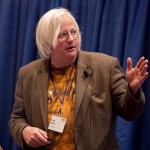 Programming or coding is becoming the 4th basic skill for everyone following writing, arithmetic, and reading. This is global statement.
Programming or coding is becoming the 4th basic skill for everyone following writing, arithmetic, and reading. This is global statement.
Coding for kids is a global industry that is on the verge of disrupting global education. And is as important as learning to cook.
Nepris is a company connecting educators with industry. I had the privilege of appearing as the talking head expert on programming for kids in Austin, Texas.
I was the computer guru programmer offering advice to young high school students, just starting down the coding career path, or at least thinking about it.
The students asked me questions about my long career as a computer programmer and coding architect. Here are the distilled questions and some thoughts on coding and larger life issues:
Q: What was your first computer language?
A: APL (A Programming Language) We had APL terminals scattered around campus at Princeton. One needed a special keyboard since the language looked like Greek.
And this was a huge advance. Just a few years before, there were cards for each line of code. Engineers could be seen running around campus with huge trays of punched cards at 2:00 am in the morning to the computer building.
Now, all you have to do is to type your code into a laptop. No more punch cards and special key boards.
Q: How much money do you make?
A: Depends, is it salary (I work for someone) or if I do contract work (special projects)? Contract work pays more, sometimes a lot more depending on the computer language you know. But, you jump from company to company.
Q: What advice do you have for those just getting into programming?
A: ‘Learn to cook”.
Not just you cooking solo, alone in a kitchen but as a group, in a professionally equipped kitchen, cooking for large numbers of folks.
Why? Programs are so complex that teams of coders work together just like you’ll have to learn to work with people cooking
SOME THOUGHTS ON COOKING AND CODING
Or if you don’t want to learn cooking, one could get into directing live theater or conducting a symphony orchestra.
But of those three activities, what’s most accessible right? We all need to eat. We all need to work together.
Today, with so many CPUs (computer central processing units), and now GPUs (graphical processing units), the challenge is to write programs that don’t bottle-neck or crash unnecessarily.
That’s a new way of thinking of coding, and some of our pre-computer jobs contain important ingredients to future coding success.
Using a kitchen efficiently means watching the pot so the water does not boil over, when one could be cutting onions or slicing carrots. Coding choreography matters when team of programmers work together.
FINAL THOUGHTS
As a young person, we get away with all the pizza and late nights, but then old habits die hard. Shifting gears in later life may be more than a slight headache.
Don’t risk it: start changing those habits early in your career.
Anyway, you get the idea. Kids wanted to know about coding, how to get into it and how much money could they make? Their last question was a good one, very open-ended:
I think many immediately thought I was going to talk about the health benefits of cooking, which I did. But the much bigger issue is developing good habits early in life such as learning the discipline of following instructions and developing the right procedures, which at the end of the day is what cooking and coding are all about.
BTW: You can watch the interview of you don’t mind creating a free account with Nepris (if you’re in industry and are willing to speak with high schoolers on occasion, thatmight be a good career move).